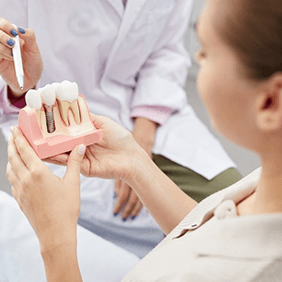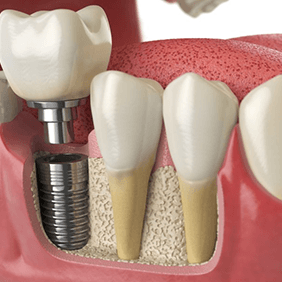
Missing permanent teeth is an oral health problem that can impact other areas of your life outside of just your mouth. Without a complete smile, you may feel your self-confidence dwindling, have a difficult time chewing your food, and notice that effectively brushing your teeth is a little harder. With dental implants, Dr. Upton and our team can rebuild your complete smile to mimic nature’s oral design.

Dental implants themselves are small, titanium posts that are surgically placed below the gumline to restore the missing root structure of the teeth. Because of the biocompatible material they’re made of, they’re able to mimic nature and fuse with the jawbone through a process called osseointegration. This provides the dental implants with the exceptional strength and stability needed to anchor your restoration and restore your smile.

Dental implants restore a patient’s smile by rebuilding their missing teeth from the roots up. This allows their future restoration(s) to remain stable in their jawbone for many years to come with proper care. For them to work, the procedure involves multiple steps to ensure their success. During your initial visit, our team will walk you through the entire process so that you know what to expect at every step. Read on to learn how dental implants work.

The first part of your treatment is to undergo an initial consultation with Dr. Upton. He will evaluate your oral health and medical/dental history, and determine if dental implants are a viable option for restoring your smile. We’ll also look for any underlying issues that’ll need to be treated beforehand, such as cavities, decay, gum disease, or insufficient jawbone density—each of which can risk implant failure. If we detect any existing problems, we’ll provide preliminary services to get you back to oral health. Afterward, we’ll review your treatment plan and walk you through the process, including the overall cost and timeframe.

Once you’ve undergone your initial consultation, our team will schedule you for implant surgery at a later time. The good news is that we perform the entire procedure in-office, so you won’t have to travel across town for your appointment. You’ll be able to work with a dental team you already know and trust, that way you can feel more confident about your treatment.
To start, we’ll provide you with a local anesthetic to keep you free of discomfort throughout the process. We also offer sedation dentistry to help you remain as relaxed and comfortable as possible. Dr. Upton will then make an incision in your gums to reach your jawbone and insert your dental implants in their designated locations. We’ll then suture your gums closed around the site and place a dental cap over the metal posts so that you can heal comfortably.

The next part of the process is to undergo osseointegration, which is when the dental implants fuse with the jawbone tissue. This is what will allow them to be incredibly stable when supporting your restorations. Though every patient is different, this process can take four to six months to complete. Once you’ve recovered, you’ll come back to us to receive your abutments—small metal connectors that will connect your restoration(s) to your dental implants. Impressions will be taken to construct your custom teeth and you’ll wait for a few weeks for your gums to recover.

When they’re ready, you’ll return to our office so that we can attach your new dental crown, bridge, or denture to your implants. Our team will confirm that your bite is comfortable and that you’re satisfied with the results while also answering any questions you might have. If all is well, we’ll send you on your way to enjoy your new and improved smile!

Dental implants offer all sorts of benefits that you can’t get from other tooth replacement options. This is because they replace the roots of the missing teeth – not just the chewing surfaces. Here are just some of the exciting advantages you can expect.

Dental implants look and feel just like natural teeth. You shouldn’t notice a difference between them once they have completely fused to the jawbone. Here are some of the benefits you can experience every day:

In addition to daily benefits, your health will be positively affected by your dental implants. Here are a few of the health benefits you can look forward to:

When you choose dental implants, you are making an investment in the future of your smile. Here are some of the incredible advantages you can experience for many years down the road:

Dental implants can replace any number of missing teeth, making them an excellent treatment option for countless patients. However, there are certain situations in which somebody might not be a good candidate for the procedure right away. In these situations, preliminary treatments like gum disease therapy or a bone graft may be necessary. That’s why the initial consultation and oral examination by Dr. Upton is so important. Depending on your unique tooth loss situation, our team will let you know how we can restore your smile with dental implants.

There are three key factors you’ll need to have in order to qualify as a good candidate for dental implants:
If you aren’t considered a good candidate for dental implants right away, you could still potentially become one! We’re happy to help coordinate services like gum disease treatment, bone grafts, and much more to help you get ready for the new smile you deserve.
Once we’ve ensured that dental implants are a good choice for you, we’ll work on the details of your treatment plan. This includes the estimated price, length, restoration type, and number of dental implants. Fortunately, we can create a dental implant treatment plan to help you replace any number of missing teeth throughout your smile.

If you’re missing one tooth, we can place a dental implant below the gumline and into the jawbone where the roots of that missing tooth used to be. This will anchor a custom-crafted dental crown in place to fill the gap between your teeth, no alterations to your natural pearly-whites necessary.

For multiple missing teeth in a row, we’ll place two dental implants at either end of the gap in your smile. These will support a dental bridge in place and preserve the alignment of your surrounding teeth. For multiple missing teeth throughout an arch, we’ll use several carefully placed dental implants to secure a partial denture.

For patients missing all their teeth in the upper or lower jaws, traditional full dentures aren’t the only option available anymore. A full denture can be anchored securely into place with anywhere between four to eight dental implants. This provides the dentures with a reliable foundation and unmatched stability, comfort, and durability.

The entire dental implant procedure is customized to fit each unique patient’s needs, which is why there’s no singular price tag attached to it. The cost will be based on how many dental implants you need to have placed, what type of restoration you require, and other important factors. During your consultation, we’ll walk you through your entire treatment plan, including details about the cost of each portion of the process. If you would like to schedule a consultation with Dr. Upton, reach out to our team today!

In order to be successful with dental implants, you may need preparatory procedures before your implant surgery can take place. For example, if you have a gum infection, you may require periodontal therapy before the posts can be put in. Or, you may need to undergo a bone graft to make sure your jawbone is robust enough to support an implant. These preliminary procedures will add to the overall cost.

Dental implants consist of three parts: the post, the abutment, and the restoration. When planning, Dr. Upton customizes treatment for each patient, which means that each part of your dental implant is carefully chosen to give you the full benefits of replacement teeth. Also, just as different brands of cars utilize various qualities of parts, the brands of the parts we choose for your implants will impact the cost you pay.

If you look only at the initial cost of treatment, dental implants are clearly the most expensive option. However, traditional bridges and dentures must be replaced about every five to ten years, which means you’ll end up paying this fee again and again. On the other hand, while implants cost more upfront, they typically don’t need to be replaced for decades. Over time, dental implants often prove to be the wiser financial investment, especially when you consider all the priceless benefits they offer like stronger jawbone support.

In general, dental insurance plans don’t usually include coverage for the dental implants themselves. However, there are portions of the process that may be covered. For instance, preliminary work, like gum disease therapy or bone grafts, as well as the restoration may be included in your benefits. We won’t know for sure until we’ve had the chance to look through your individual policy. During your consultation, we can go through your benefits with you and discuss how we can maximize your coverage.

We understand the upfront cost of dental implants may be too much for you to pay for treatment entirely right away. That’s why we accept payment through CareCredit. This third-party financier is trusted in the medical and dental fields and offers a low-interest rate to those who qualify. That way, you can more easily afford your implants through small monthly payments rather than a one-time large sum. If you have questions about any part of the financial details of your treatment, don’t hesitate to ask us during your consultation or give our office a call!

Once we’ve completed the initial dental implant placement, it’ll fall on you to carefully tend to your smile as you recover. To give you an idea of what you can expect during your healing period, we’ve provided several useful tips and guidelines below; of course, please contact our office if you have any questions or experience complications!

Following your dental implant surgery, one of your top priorities will be taking proper care of the blood clot that forms over your surgical site. You’ll need to avoid touching or disturbing this area at all to promote healing. You’ll also need to refrain from smoking or using tobacco products, and don’t use a drinking straw since the suction can dislodge your blood clot.

It’s not always easy to tell the difference between common post-op symptoms and concerning ones. It’s normal to feel mild discomfort or soreness for the first few days, but if things seem to persist or worsen, give our office a call. Some typical side effects you can expect include:

After receiving dental implants, you’ll need to stick to a soft food-only diet for a few days as your mouth heals. Your meals can include things like:

Maintaining proper oral hygiene is what ensures your dental implants are given the chance to healthily fuse with your jaw. Try practicing these tips:

Once you’ve recovered and your implant posts have fused with your jaw, you can finally receive your custom-made dental restoration. You may feel some mild sensitivity in your gums, but if you notice any bleeding or swelling after this step, be sure to let us know right away so we can address it. Otherwise, you’re all set to enjoy the benefits of your newly restored smile!

Proper care and maintenance of your dental implants is essential for ensuring their longevity and keeping your smile healthy. This is why we have put together a few simple guidelines for incorporating good habits into your daily routine. By following them and calling us when you need help, you can enjoy the full benefits of your dental implants for a lifetime!

Maintaining excellent oral hygiene is crucial for the health of your dental implants. So, brush your teeth at least twice a day with a soft-bristled toothbrush and toothpaste with the ADA seal of approval. Also, floss daily to remove plaque and food particles from between your teeth and around the implant area. If you want to be thorough, consider using a non-alcoholic antibacterial mouthwash to further reduce the risk of infection and ensure your implants remain in top condition.

A balanced diet is vital for the health of your dental implants and the rest of your body. Include plenty of fruits, vegetables, lean proteins, and whole grains in your meals. At the same time, try to limit sugary snacks and drinks that can contribute to plaque buildup and gum disease. Staying hydrated is also important, as it helps maintain saliva flow, which naturally cleanses your mouth and reduces the risk of implant complications.

Certain habits can damage your dental implants and compromise their longevity. Try to reduce the frequency of vaping, smoking, and using tobacco products, as they can lead to gum disease and bone loss around the implants. Also, avoid chewing on hard objects like ice, pencils, or fingernails, which can cause chips or cracks in your implants with repetition. While it can be difficult to quit some of these habits, it’s best for the safety of your smile. So, reach out to our office if you need resources to help you.

Protecting your dental implants from damage is essential to keep them strong and functional. Wear a mouthguard if you participate in contact sports or other activities that could result in oral injuries. If you grind your teeth, talk to Dr. Upton about getting a nightguard to protect your pearly whites while you sleep. By taking these precautions, you can help ensure your implants remain secure and continue working for you.

Regular dental checkups are one of the most important ways you can maintain the health of your dental implants. So, try to visit us at least twice a year for professional cleanings and examinations. These visits allow Dr. Upton to monitor the condition of your implants, detect any potential issues early, and provide treatment if necessary. Staying proactive with your dental care will help you enjoy a healthy and confident smile for years to come!
One of the biggest advantages of dental implants is their long-lasting nature. With proper care, you can expect your implants to last for 30 years or more! This is significantly longer than traditional bridges and dentures, which usually must be replaced every 5 to 15 years. To ensure your implants remain in great shape, be sure to brush twice a day, floss daily, and rinse with mouthwash regularly. In addition, you should attend dental checkups and cleanings approximately every six months. Finally, avoid chewing on anything too hard/sticky or opening packaging with your teeth.
When placed by a qualified implant dentist, dental implants are a very safe and effective method for replacing missing teeth. Implant patients generally must be in good health. If you have low jawbone density or gum disease, Dr. Upton will address these issues first to make your dental implant surgery safer and more successful. Certain medical conditions like diabetes and cancer could make surgery/healing risky. Be sure to share your medical history with Dr. Upton during your initial consultation.
No! Dental implants look and feel just like natural teeth, so people likely won’t be able to tell you have a restored smile. Implants integrate directly with the jawbone, effectively replacing missing tooth roots. This means you won’t have to hold your jaw in a strange way to keep them in place like you might have to with poorly fitting dentures. In addition, Dr. Upton will take impressions of your mouth that will then be used to design personalized restorations. Whether you are receiving a crown, bridge, or implant denture, your custom restoration will blend in seamlessly with your natural smile.
The earliest dental implants are old – REALLY old. Archeologists have discovered ancient Mayan skulls with pieces of seashells and carved stones like jade replacing missing teeth. Some of these early dental implants, which date back to 600 A.D., had actually fused to the jawbone. Thankfully, modern dental implants are much more reliable and precise! Contemporary implants were discovered in the 1950’s by a Swedish orthopedic surgeon who realized that he could not remove a small titanium cylinder he had placed in a bone to study the bone healing process. Titanium then became the gold standard for dental implants, as it could fuse with the jawbone. Modern dental implants have been used since the 1970s, and the American Dental Association estimates that more than 5 million are placed each year.